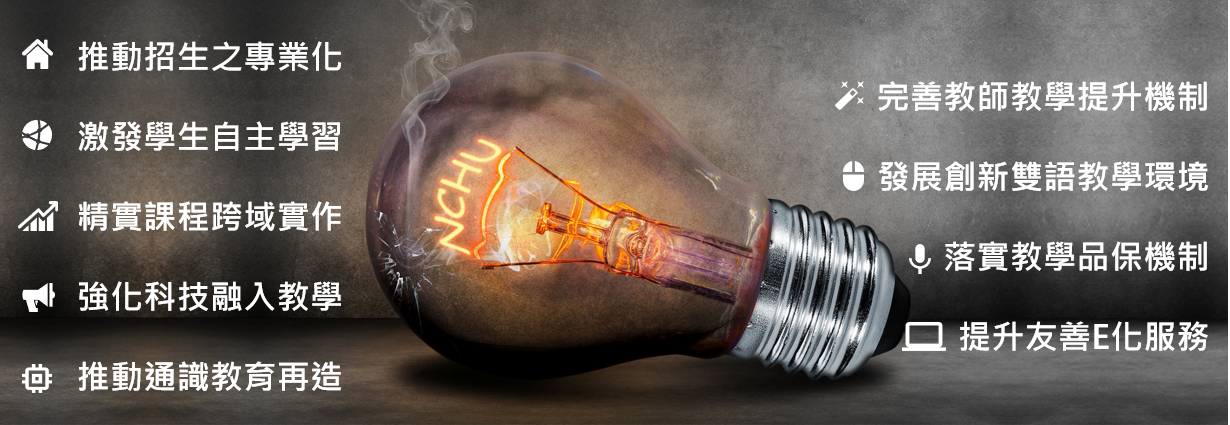- HOME
- Dean's Office
- Introduction
Ⅰ.Introduction
The Office of Academic Affairs is currently comprised of six units: Registration Division, Curriculum Division, Admission Division, Development of Teaching and Learning Center, General Education Center, and Bilingual Education Resource Center. The units are responsible for student status and grades, course management and selection, admission exams and recruitment, professional development for teachers and student learning, general education course planning and management, and promoting all-English courses.
Ⅱ. History
| December 1954 | In December 1954, NCHU established Registration Division, Publishing Division, Library, and Publishing Committee under the Office of Academic Affairs. |
| December 1954 | Established Curriculum Division. |
| August 1980 | Promoted Library to an independent first-level unit. |
| August, 1990 | Established Graduate Academic Affairs Division. |
| November 2001 | Established Office of General Education Committee. |
| August 2004 | Renamed Office of General Education Committee as General Education Center. |
| In August 1, 2006 | 1.Established and Teaching Division. 2.Publishing Division merged into Teaching Division. 3.Merged responsibilities of Graduate Academic Affairs Division into other units: student status and grades into Registration Division, courses into Curriculum Division, recruitment into Admission Division, and global recruitment and admissions into Office of International Affairs. |
| February 1, 1997 | Expanded and renamed Teaching Division to Development of Teaching and Learning Center. |
| August 1, 2008 | Promoted General Education Center to a first-level education unit that is no longer under the Office of Academic Affairs. |
| February 1,2018 | Reintroduced General Education Center as a second-level education unit under the Office of Academic Affairs. |
| August 1, 2021 | Established Bilingual Education Resource Center. |
Ⅲ. Development Focuses
The Office of Academic Affairs abides to three major working principles: active service, performance-oriented, and forward planning as we continue to promote NCHU's education policies. Development focuses to advance education quality and NCHU is as follows:
(Ⅰ) Develop professional recruiting to ensure diverse admissions
Develop professional recruiting, for example, giving priority to socially and economically disadvantaged students in admissions, organize NCHU Wings Recruitment program, give more quota to indigenous peoples, scale up special recruitment, organize NCHU Lecture seminars, and optimize/ simplify review process for individual applications to strengthen admissions quality and diversity.
(Ⅱ) Inspire diverse and autonomous learning to achieve adaptive development target
Strengthen student learning and roll out individual tutoring, organize sharing sessions to strengthen social interactions, and guide students to apply and convert their learnings to help students develop adaptive learning.
(Ⅲ) Facilitate lean courses and interdisciplinary practicum to integrate learning and application
Change graduation and course requirements to promote course integration across departments and colleges, flexible teaching, and courses jointly launched by undergraduate and graduate programs. Ease restrictions against courses for senior students and graduate students to cultivate basic scientific research competencies in undergraduate students.
(Ⅳ) Strengthen integration of technology into teaching to build digital teaching capability in teachers
Provide various technology tools for teaching, perfect digital teaching platform functions, develop digital courses (MOOCs & open courses), and supplement with friendly digital teaching tools, such as NCHU's innovative AI PE Teacher system that introduces AI into physical education. We also aim to organize events to help build digital teaching capability in teachers.
(Ⅴ) Reinvent general education to ensure teachings align with society's demand for interdisciplinary talents
The new framework is competency oriented, establishing diverse teaching models and self-directed learning across three major domains: core competencies, language competencies, and disciplinary competencies. Organize Hui-Sun lectures and general education lectures, general education seminars, and foreign language courses to give students diverse learning opportunities and encourage interdisciplinary learning.
(Ⅵ) Perfect teacher advancement systems to improve education quality
Roll out mentor programs for teachers and strengthen support measures, perfect regulations on diverse promotion pathways for teachers, and organize various professional seminars, interdisciplinary teacher groups, or workshops to enhance education quality and support professional develop in teachers.
(Ⅶ)Develop innovative and bilingual learning environments to foster talents with professional knowledge and bilingual capabilities
Promote innovative teaching programs, develop innovative teaching methods suitable for different courses, and establish a connection between professional knowledge and industry application. Carry out the 2030 Bilingual Nation policy, give incentives to full-English courses, and create a bilingual environment on campus to strengthen motivation and opportunities to learn English, thereby fostering more competitive talents with both professional knowledge and bilingual capabilities.
(Ⅷ) Implement education quality system to ensure sustainable development
Regularly organize department evaluations, IEET engineering and technology education certification for the College of Engineering, AACSB certification for the College of Management. Implement self evaluation and improvement mechanisms, organize student learning surveys, and track teaching review and coaching systems. Promote departmental course reviews and prioritization of core competencies to ensure education quality and performance.
(Ⅸ) Enhance friendly electronic services to optimize quality of administrative services
Provide a single liaison to students for various student status or grade applications, integrate information technology, and develop digital electronic certificates/ documentation to continue promoting digital application services, simplify processes, and improve process flows. Improve testing efficiency by uploading admissions exam information and grading online as well as integrate the admissions and Academic Affairs System to analyze and apply academic affairs information.
Medium- and Long-term Goals


